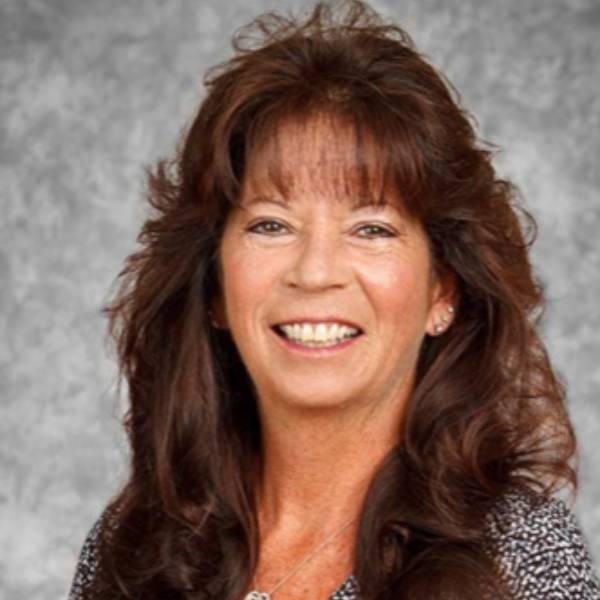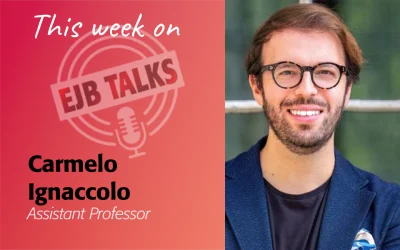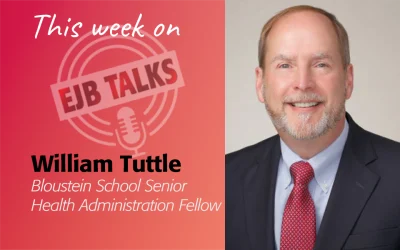In March 2020 the spread of COVID-19 was rampant and New Jersey was at the epicenter of the outbreak. Hospitals and their administrators were faced with unthinkable challenges. In combatting these challenges, hospitals had to change their way of operating. For our third episode this season, Professor Stuart Shapiro welcomes Assistant Teaching Professor Susan Krum to discuss the rapid response in New Jersey’s hospitals, how innovations here were shared across the county, and how they have left us better prepared for a potential second wave of COVID-19. They also discuss how the pandemic has afforded her students real-world experience and appreciate the impact of their chosen field.
Stuart Shapiro
Welcome to EJB Talks. I am Stuart Shapiro, the Associate Dean of Faculty at the Bloustein School. And the purpose of this podcast is to talk with my colleagues and our alumni about policy, planning, and health and the interaction between these issues and how they affect people in New Jersey, the United States and the world.
In keeping with the theme of the start of this season, where we are talking with our new faculty, today I’m speaking with Professor Susan Krum, who last year started teaching in our relatively new but very quickly growing Health Administration program. Professor Krum, thanks for joining us.
Susan Krum
Hi Stuart, thanks for having me.
Stuart Shapiro
Let’s start with some general background. Tell us a little bit about yourself and your background in healthcare.
Susan Krum
Sure. My formal education is really in speech and hearing. I have my undergraduate degree in speech pathology, and my master’s and my doctorate are both in audiology. So I started out my healthcare career as an audiologist. And then through some luck and some hard work, I was able to climb the ladder of success and ultimately be Vice President of Ambulatory Services for a number of years at Robert Wood Johnson.
So I was able to expand outpatient services, develop new outpatient services. And really, the responsibility I had there was a tremendous job and allowed me to just expand everything on the outside of the walls of the acute care hospital. So it was a wonderful adventure. It really taught me a lot and gave me a fantastic opportunity to understand acute care as well as ambulatory care for the whole continuum of care for a hospital network system.
I also worked down in South Jersey for a network, that I was responsible for their physician enterprise group. So I gained a lot of knowledge, a lot of skills in how we were moving to value-based purchasing, how population health initiatives needed to be explored for value-based reimbursement models, and really enjoyed seeing how we could expand upon primary care, and really build teams of collaboration for patient care. So I’ve had a lot of experience, mostly on the outside of acute care. But my Lean Green Belt also allowed me plenty of opportunities to run projects within the hospital system.
Stuart Shapiro
Sounds great. That’s quite a varied background, which must be a great asset for our students. We started this podcast right when the pandemic hit as an effort to try to reach out to people while we weren’t physically present in New Brunswick. And many of the episodes have centered around the pandemic. And given that we are talking about hospitals, it seems like an appropriate place to start off today. New Jersey was an epicenter of the COVID-19 pandemic. What changes have you seen or heard about how hospitals are operating as a result of what we went through in March and April?
Susan Krum
Well, as we all know, the hospitals were hit very hard when the pandemic hit New Jersey. And all elective surgeries and elective procedures and outpatient centers really shut down quickly, in order for us to make the switch to caring for COVID-19 patients. So that really taught us the lesson in being prepared. And what I’m seeing from an operational standpoint, with acute care hospitals, they’re really running dual entities right now. And by that, I mean, they are running part of their organization for the COVID factor, making sure patients get isolation, patients get tested, patients you know, stay away from spreading to the other populations. But they also have a demand for maintaining the medical end of services for the community. So they are running another side of the hospital, as they were before COVID, and making sure that there are medical services for elective surgeries.
And keep in mind when we talk about elective surgeries, right away people think oh, it’s a choice. Some things are called elective surgeries that really aren’t so elective. Let’s just put it that way. A friend of mine, for instance, had to schedule open heart surgery, and it was considered an elective. So when we say elective surgeries and elective procedures, they’re medically necessary for these patients. It’s not really a choice. It’s just that it’s a procedure or a service that can be scheduled. So I think the hospitals have really been looking at their operations as kind of this split design of what floors, wings, staff, supplies do we need for our COVID populations? How do we keep everyone safe? And at the same time provide the medical services necessary for the rest of the population?
Stuart Shapiro
Yeah, so it’s essentially what they were… all the challenges of what they were doing before, with a new layer on top of it.
Susan Krum
Right. And, I mean, physically splitting their organization, to say, here’s the safe COVID area, and to keep other patients safe from, you know, the disease spreading. So I think that’s a huge challenge right now for all of the health care organizations in New Jersey.
Stuart Shapiro
And I’d imagine at the same time, try to keep up with how to treat COVID patients, because that is evolving quickly, still.
Susan Krum
Yes, I think we’re, you know, when it first hit New Jersey, especially, we were one of the first few states, and there was so much unknown. If we have a second surge of this pandemic in our area, I think we have more known factors that can really help us to isolate the spread of the disease and much more information on actually treating the symptoms of COVID. So we’ll be in a little bit better shape. Plus, I think, lessons learned, be prepared with our PPE, with our ventilators, make sure we have those isolation rooms, you know, more beds for critical care.
I will say New Jersey really stepped it up quickly. And within less than three weeks, all the hospitals in New Jersey really doubled their capacity for critical care and intensive care units to handle this COVID pandemic.
Stuart Shapiro
Wow. Now, as we look at the map of the United States, and we see hotspots; you know, two months ago, it was Arizona and the Southwest and Florida and the South. And now it seems to be the upper Midwest. Clearly, everyone is going through some form of what we went through. I don’t think it’s as severe because death rates are down from the disease. But still, I would guess that there are lessons that New Jersey learned that can help the rest of the country. Are there and is that sharing going on?
Susan Krum
Yes, the sharing is definitely going on even when New Jersey was hit. I know that there were plenty of hospitals that were receiving information from Washington state, who had it just before we did. And their lessons learned were things that we could take into consideration and put into action very quickly. So the same has been happening as each state goes through it, and we share our experiences. And another good part, I guess you could say is, you know, the expansion of the digital technology and being able to share the data quickly with other facilities, I think has really helped so that we’re not seeing as many deaths, even if we’re seeing as many cases in some of these states.
Stuart Shapiro
Yeah, I mean, the whole field of health informatics is really sort of been forced to mature very quickly in 2020.
Susan Krum
Yes, In a very short period of time. And another thing, since we’re talking about the digitals. The silver lining, I guess if there is one to the COVID pandemic, was the expansion of telehealth and the importance of telehealth when we’re going through something like this. But hopefully, it’ll be something that’s maintained in the future. Because there are so many patients who can’t do appropriate follow up. Who don’t have that connection with their physician through physical limitations? That I really think the expansion of telehealth right now, has proven very effective for some of these patients with chronic needs, and the need for monitoring and, you know, just collaboration of care with a variety of different providers. Telehealth has really opened that door for those patients. So if there’s something positive to come out of all of this, I’m really hoping that telehealth is here to stay. Helps the patients that it’s appropriate for and we can expand upon it even more.
Stuart Shapiro
Yeah, our colleague, Professor Bhuyan, who will be a guest in one of the next couple weeks, as I know has written a fair amount about telehealth as well and is a big advocate there.
So, those of us that, you know, follow this data and pretend to be epidemiologists or experts in the area. We’ve heard for months about a second surge. And now in New York City and even in some areas in New Jersey, we’re starting to see increasing numbers. Are hospitals preparing for a second surge, is it going to look different than what we saw in March and April?
Susan Krum
It’s going to work differently because we’ve now been able to stockpile supplies that were hard to get. Also, making sure that we have the correct amount of beds available. So using predictive analysis, the hospitals have at least a head start that if it happens when it happens, they have the facilities prepared to flex and be adaptable to fit those needs. So it’s not going to hit us from behind as it did before. Everyone learned their lessons. They’re preparing ahead. They’re watching the analysis, they’re watching the spikes. So I really think it’s going to be very different than what we experienced the first time.
Stuart Shapiro
Just as other states are learning from New Jersey, probably New Jersey is learning from New Jersey’s first experiences.
Susan Krum
Exactly, lessons learned.
Stuart Shapiro
Yeah, sure. I’m sure there are plenty of them. And you’ve outlined several already. I want to switch to talking a little bit about our academic program. Can you talk a little bit about the MHA program, and the Health Administration undergraduate major, and talk about the jobs and careers we’re preparing our students for?
Susan Krum
Sure, I’d love to. And I’m greatly involved in the curriculum for the master’s program in Health Administration. So I really have been able to look at the design of the courses. And I’m very confident that everything that we offer really is top rate. We prepare our students, both undergrad and grad, to understand strategic thinking, to understand informatics, to understand the operations of day to day management of hospitals. And with our graduate program, we really are looking to prepare them to get to that higher-level management director position. To be able to just jump right in feet first, and be able to run a department from both the financial aspect, operational, strategic planning aspect.
We’re very heavy on making sure that they understand, theoretically, what’s going on. But also, I think what a lot of professors like myself have to offer is, taking that foundation of knowledge and making it into real-life experiences. So they get to understand the theory and the concepts, but then we’re able to bring it to life for them. So that when they get out in the field, during their internships, they always come back to me and say; an aha moment, “I remembered when you taught me such and such and it clicked and it worked.” And, you know, they’re very proud of themselves. So during their internships, I think it’s what pulls it all together for the master’s program.
Stuart Shapiro
What’s an example of that “such and such” there that they’re learning and then seeing operate in the real world?
Susan Krum
One that comes to mind was really a team collaboration. Part of their internship, we ask them to work with their supervisors, to use their Lean experience and their leadership experience foundation to plan a project. And they have to be the team leaders. And when I take my experiences and blend it with the knowledge that we’re teaching, I often don’t just give the positive aspects, I’ll give a heads up, here’s what also can happen, in a negative direction. So there have been times when my students have come back and said, “You always talked about being a team leader, you always talked about how you just have to blend with different personalities.” And they said, “You were right. You have to learn your team’s personalities. You have to learn who you can depend on. And you have to do it quickly to get the project up and moving.” So, that to me is a compliment that they’re not just learning from the books, but they’re actually putting the book knowledge and gaining from the experiences that I’ve had when they go out in the real world.
Stuart Shapiro
That’s great. What, if anything, has changed in the past six months about what we’re teaching our future hospital administrators and Health Administration students?
Susan Krum
Well, I know that every professor is trying to bring in the current pandemic into their teachings. So for instance, I know myself and Professor Bhuyan, we teach population health. So what a great time to be teaching population health, and looking at the CDC, and looking at the guidelines that are presented. And is this good information getting to the community? And getting them to think about the big picture of population health. And how do we shift the culture from, wait till something happens, be reactive, to being preventative? And in this day and age of COVID, what better way than to bring even just the daily tallies to notice and say, OK, are we doing a great job as population health leaders?
So I know we’re using that and from… I teach financial accounting as well for hospitals, health care. And using just the COVID, and the loss of funding, I mean millions of dollars, and being able to walk the students through financial accounting for organizations, and what does it mean when you don’t do elective surgeries? And what does it mean when you close your physician offices from a financial aspect? So, again, you know, COVID is not a great thing. We all know that. But from a learning experience, we’re trying to tie that in to here’s real life and what to expect when you’re in the real world, trying to maintain your departments or your areas.
Stuart Shapiro
It sounds like a lot of the conversations we’re having in managing a school or university as well.
Susan Krum
Yes.
Stuart Shapiro
Very common themes there. You mentioned internships earlier, and I want to end with that. We are sending students out into the field amidst all this. And what have you learned from them about what’s been going on in hospitals and elsewhere as they are going out and embarking on careers and doing internships?
Susan Krum
Unfortunately, our spring internships were cut short.
Stuart Shapiro
Right.
Susan Krum
So we did, you know, quite a few mock internships. But also projects on what was going on. But when students go out for their internships, they always come back with a great experience because of their placements. But a lot of our students work in healthcare settings. They may work at a dentist’s office, they may work in a pediatric office. And they’re able to take their work places and still show projects and show all of their skills toward making something… improvements in those locations. So the students come back, and they’ll do a full presentation on what their project was. And give us full examples. Show us what competencies they really pinpointed on for their learning process. And I just think that we owe a lot of debt to the neighboring hospitals and facilities that allow our students to go out there. And, we’re eager to get them back out there, which we are this semester.
Stuart Shapiro
Are they doing mostly virtual stuff this semester? Or are they actually physically in?
Susan Krum
This semester, we did just win an appeal that our students can go out in the field. So they will be in their various settings, and able to really do hands-on. So that was fantastic.
Stuart Shapiro
And I expect we’ll be hearing some amazing stories from them in the weeks and months ahead.
Susan Krum
Yes.
Stuart Shapiro
Well, thank you very much for appearing today, Professor Krum. This was a great discussion. I know I learned a lot, and I’m sure our listeners will as well.
Susan Krum
Great. Fantastic. Thanks for having me.
Stuart Shapiro
Also, a big thank you to our production team, Amy Cobb and Karyn Olsen. We’ll be back next week with another talk with another new faculty member at the Bloustein School. Until then, stay safe.




